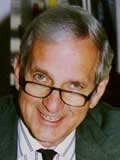Editor's Column: Surgical Wisdom

Martin McKneally
|
Russell Gruen, Professor of
Surgery and Public Health
at The Alfred and Monash
University and Director of
the National Trauma Research
Institute, Melbourne, Australia,
and our Peter Crossgrove lecturer,
gave a stimulating review
of practical problems in the control
of bleeding. Russ had spent
a year in the Harvard Bioethics Program, while studying
Health Policy in Boston. His essay on Surgical Wisdom (1)
prompted me to look back at my formulation of the
normal process of linear thinking that leads from observation
to decision-making.
We ordinarily simplify our observations of the universe
to a manageable set of observed data and look for relationships.
Validating these relationships leads to information.
We can make more sense of our observation - in patients or
experiments or life, if we next place them in a conceptual
framework, such as the framework of neuroscience or biology
or other scholarly disciplines. When we succeed in organizing
our information within these frameworks, we come
up with knowledge. The final step in the linear pattern of
thinking is trying to make judgments to predict or evaluate
the importance and consequences of our knowledge - of
a particular case or a particular biologic phenomenon.
Those who make reliable and sound predictive or retrospective
judgments develop a reputation for wisdom.
Russ describes wisdom as “a complex human trait that
embodies rational decision – making, general knowledge
of life, empathy, compassion, altruism, comprehension of
diverse values, emotional stability, insight, self-reflection,
and the ability to proceed …. in the face of uncertainty.”
This definition is based on his study of Aristotle’s description.
Aristotle “had a particular practical view of wisdom.
He proposed that being wise required the ability to see on
which occasion which course of action was best supported
by reason.” “The wise surgeon consistently (chooses) the
best course of action, based on superior judgment, rich
understanding, few unjustified beliefs, and a strong moral
compass.” “In our own moments of indecision we are
likely to wonder ‘What a wise surgeon would do in this
situation?’. The wise surgeon also has a rich understanding
of the extreme nature of patients’ experience when undergoing
surgery. Miles Little (his thoughtful Melbourne
surgical colleague) characterized this as an ordeal, a need
for rescue, a sense of proximity and privileged knowledge
inherent in the surgical encounter and its physical and
emotional aftermath.
|
“Completion of training signifies competence, sufficient
to enter clinical practice… Wisdom, however, is not just
the accretion of layers of experience upon a core of taught
competencies... Superior judgment requires the deliberative
emotional and social skills that are refined by solving problems
many times over.”
This thoughtful essay is incompletely represented
here, but will reward careful reading. How we balance
our judgments, what frames of reference we use to make
surgical decisions is generally based on frameworks we
learn from our mentors and role models. Reflective
thinking about our experience and careful evaluation
of our previous judgments leads to a level of wisdom
– of reliability of judgment that characterizes the wise
surgeon. On the basis of these assessments, surgeons are
better able to handle the complex issues that confront us,
like the hotly debated current issue of organ donation
after cardiac death. How long should the hands-off time
be before we initiate restoration of circulation to salvage
transplantable organs? How should we think about terminal
sedation of suffering patients? When is it reasonable
to try a new and unproven treatment on someone’s
parent or child? What is the fair distribution of our
ability to work hour after hour, or of society’s expensive
healthcare resources? Information is accumulating at a
staggering rate. There is a pressing need for managing
it using thoughtful assessment and surgical wisdom.
Jeffery Matthews, our recent Peter Crossgrove Lecturer (2)
told us that “current surgical practice is an accumulated
wisdom, mixing fact, opinion, and magical thinking in
unknown proportions.” More on this in our next issue.
M.M.
(1) Gruen RL, Watters DAK, Hollands, M J. Surgical Wisdom,
British Journal of Surgery, 2012; 99: 3–5
(2) Matthews, J. Truth and truthiness. Peter Crossgrove Lecture,
UHN Surgical Grand Rounds, June 14, 2013 (to be featured
in the next issue of the Spotlight)
|